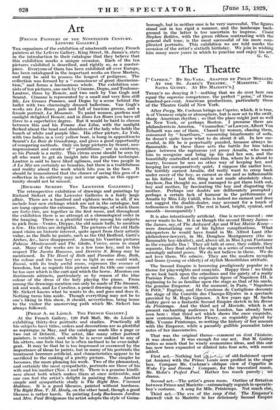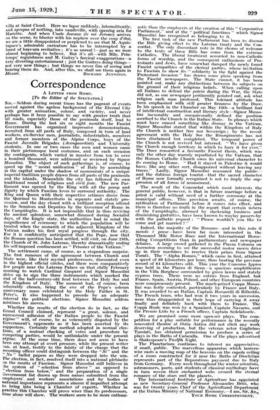The Theatre
r` CAPRICE." BY SIL-VARA. ADAPTED BY PHILIP MOELLER. AT THE ST, JAMES'S THEATRE._ " IkLinitrrz." BY SACHA GUITRY. AT His MAJESTY'S.]
THERE'S no denying it !—nothing that we do over here can equal the supreme competence, the perfect " poise," of these hundred-per-cent. American productions, particularly those of the Theatre Guild of New York. .
After Porgy, Mr. Cochran brings us Caprice, which, it is true, is of Viennese origin or atmosphere, but is now set to the swift, sharp American rhythm; so that the place- might just as well be New York, or perhaps Boston. I presume there are philanderers in America. "Counsellor," or Lawyer, Albert Von Echardt was one of them. Chased by women, chasing them, consumed by " heartburn," consuming bicarbonate of soda, he doesn't quite know what to do about it -all. In law suc- cessful, in life he is perpetually puzzled, . because always in- flammable. In these three acts the battle for him takes place between the rapturous yet prosy Amalia, who wants him to recognize and bring up his and her son, and the beautifully controlled and malicious Ilsa, whom he is about to marry, because he sees no other way of keeping her, and keeping her comparatively quiet. I suppose the earlier love, the terribly earnest Amalia, did really want to creep back under cover of the boy, as earnest as she and as inflammable as his father ; but the thing is not made absolutely clear. Anyhow, Ilsa thought so, and managed to get them both out, boy and mother, by fascinating the boy and disgusting the mother. Perhaps our doubts are deliberately prompted ; perhaps a certain lack of humour in the performance of Amalia by Miss Lily Cahill, who is indeed too earnest and does not suggest the double-dealer, may account for a touch of tediousness in this part. The rest is hard, bright, cynical, and smooth—incomparably !
It is also intentionally artificial. One is never moved ; one never wants to be. It is as though the second. Henry James— the James, say, of The Awkward Age and What Maisie Knew— were dramatizing one of his lighter complications. What interpreters he would have found in Mr. Alfred Lunt (the philanderer-lawyer), in Mr. Douglass Montgomery (the in- flammable boy-idealist), and, above all, in Miss Lynn Fontanne as the exquisite Ilsa ! They all talk at once, they collide, they separate, they float about the stage in a series of concerted but seemingly natural poses. We do not believe in them. We do not love them. We admire. They are the modern nymphs and fauns (young or elderly) of stylish Meredithian attitude.
The Second Empire is becoming prodigiously popular as a theme for playwrights and essayists. Happy time ! we think as we look back upon the crinolines and the gaiety of a really Parisian Paris. And the enigmatic figure of Napoleon III. is beginning to be as familiar upon the stage as that of his uncle, the genuine Emperor. At the moment, in Paris, " Napoleon le Petit," Eugenie, and the Comtesse de Castiglione decorate the stage of the Comedic des Champs-Elysees in a spectacle provided by M. Regis Gignoux. A few years ago M. Sacha Guitry gave us a fantastic Second Empire sketch in his Revue du Printemps. And the third act of Marlette, which is at present enchanting audiences in London, has already been seen here : that third act which shows the once exquisite, now centenarian, Mariette Fleury, so roguishly played by Mlle. Yvonne Printemps, re-writing the history of her amours with the Emperor, while a passably gullible journalist takes notes of her inaccuracies. •• That was the original theme—comment on ecrit l'histoire. It was slender. It was enough for one act. But M. Guitry writes so much that he wisely economizes ideas, and this one has now been expanded or diluted into four acts, with music added. - .
First act.—Nothing but -of old-fashioned opera (at Amiens) with the Princylkuis seen profiled in the stage box. Compare Mr. Cochran's oblique view of Coppilia in Wake Up and Dream ! Compare, for the travestied music, Mr. Hoist's Perfect Fool. Rather too much parody ; "no drama.
Second act.—The artist's green room. Outline of flirtation between Prince and Mariette—entrancingly roguish in operatic- boy's costume. A song for Mlle. Printemps. Not much else.
Third _act.—The eve of the :coup iretat. " The Emperor's, farewell visit to Marlette in her deliciously Second Empire villa at Saint Cloud. Here we lapse suddenly, intermittently, and apropos of nothing, into vaudeville, with opening aria for Marlette. And when Uncle Jerome (le roi Jerome) arrives on the scene, to bluster with his nephew over the coup d'etat, we are a little disappointed or perplexed to see that M. Aquis- tapace's admirable caricature has to be interrupted by a burst of bravura recitative ; it's so unreal 1—just as we were almost beginning to believe. But it's all—with Mlle. Prin- temps' roguishness and M. Guitry's farcical exaggerations—a very diverting entertainment • just the Guitrys doing things— not very new things but things we never tire of seeing and hearing them do. And, after this, we shall see them again in







































 Previous page
Previous page